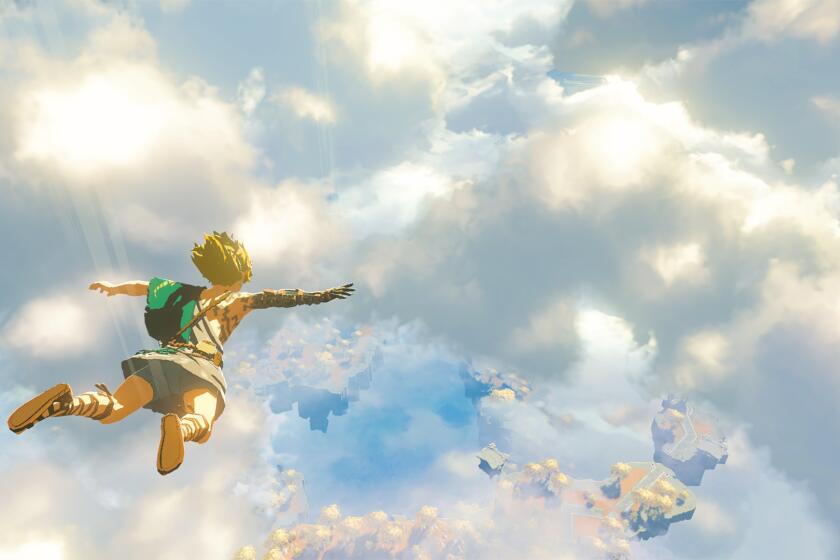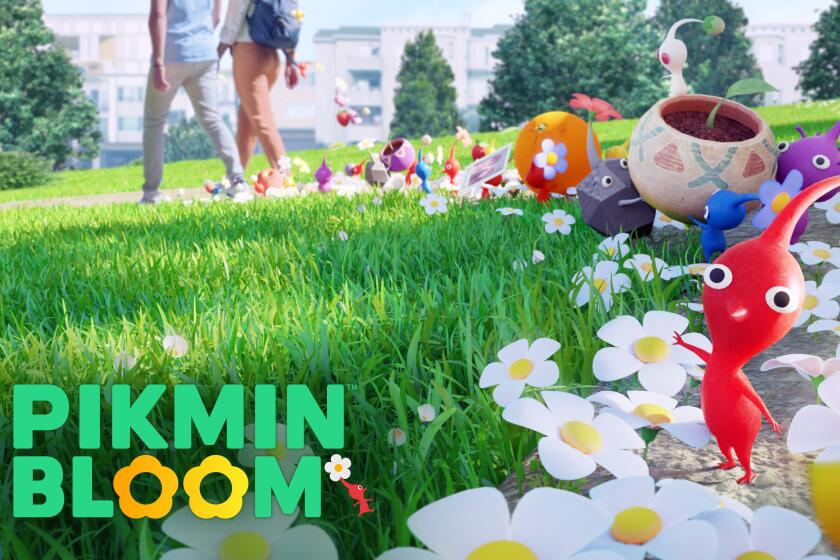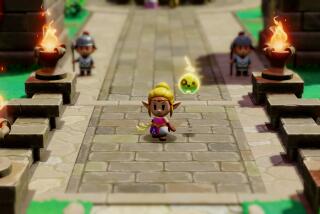Review: Is ‘Pokémon Legends: Arceus’ Nintendo’s most spiritual game?
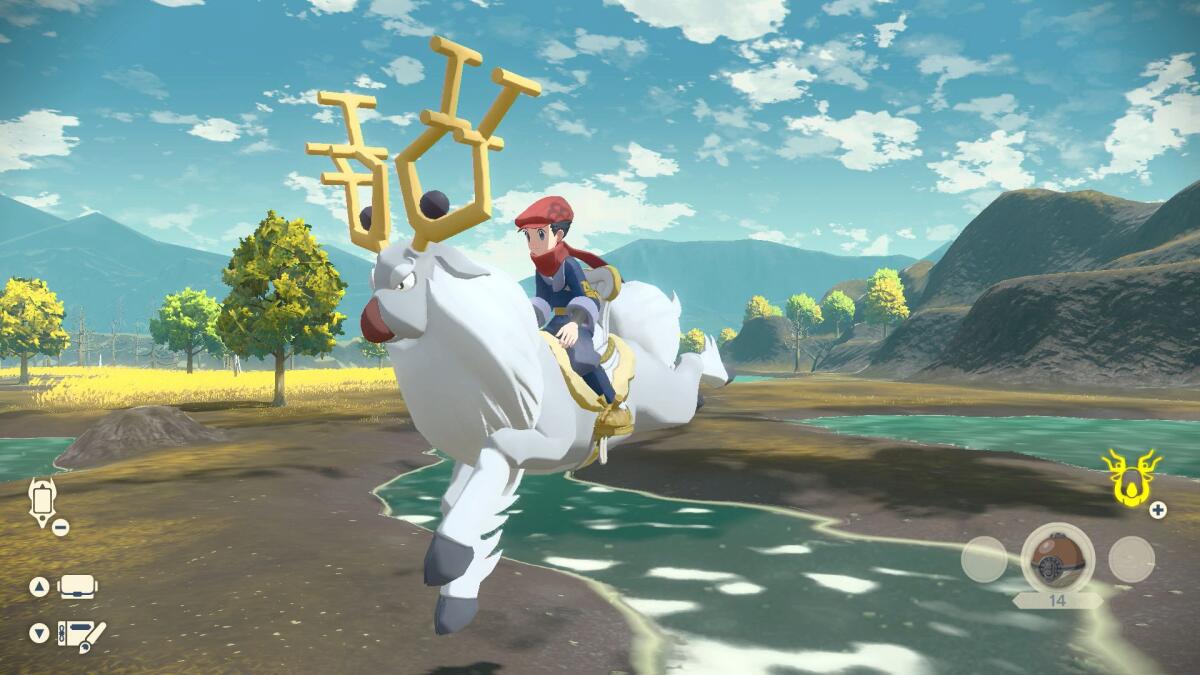
A more agile, spiritual “Pokémon”?
That’s what “Pokémon Legends: Arceus” delivers. It’s a game for Nintendo Switch that treats a mania with cutesy-odd creatures as the religion that it is — fitting play for a deeply passionate, multi-generational fanbase that worships, debates and argues over the brand with cultish intensity.
If not a complete upending of the “Pokémon” brand, consider it a solid reinvention that lightly mixes Western and Eastern philosophies. The aim: to more closely tighten the congenial relationship between players and their collection of feral but mystical animals. The look is soft, opaque at times, doing away with hi-def graphics for something more childlike, homely and calm — a video game that will likely inspire art that will grace many a parent’s fridge.
Gone are battle arenas and in their place are vast forests and feudal-inspired trappings. This is a core Pokémon world where the critters are admired for battle prowess, but also their beauty and ability to harmonize with nature as well as more divine realms.
The George R.R. Martin-involved “Elden Ring” is just one of the video games — many pandemic-delayed — we’re anticipating in 2022.
The highly anticipated “Pokémon Legends: Arceus” teased a game that would provide a bold re-imagining of the franchise, a series that, while venerable and dependable, is also borderline stale. The game mostly succeeds, serving as a reintroduction, or entry point, depending on your familiarity with the brand, for new and longtime players.
The staples for veterans are here, and the core game — fill up a Pokémon-like Rolodex — won’t throw anyone for a loop. Rest assured, the tag line — “gotta catch ‘em all” — can remain. Yet there are enough adjustments to make the game feel faster, more streamlined and more worthy of exploration. And just enough philosophical weirdness — “Where all creation was born, that is a being’s place of origin,” a vendor tells us — to maintain our curiosity through its large world.
There should be plenty to dig into.
At about 20 hours into the game, I’m nowhere near filling my Pokédex and am still learning details about the various clans and their tenuous peace agreements. As early as three hours into the game, I had a half dozen side missions, which are essentially requests from villagers to answer questions regarding their Pokémon curiosity. We meet two tribes early, one that worships time, and one that pledges allegiance to space, and they don’t appear too interested in compromising in the middle. That’s where the player comes in.
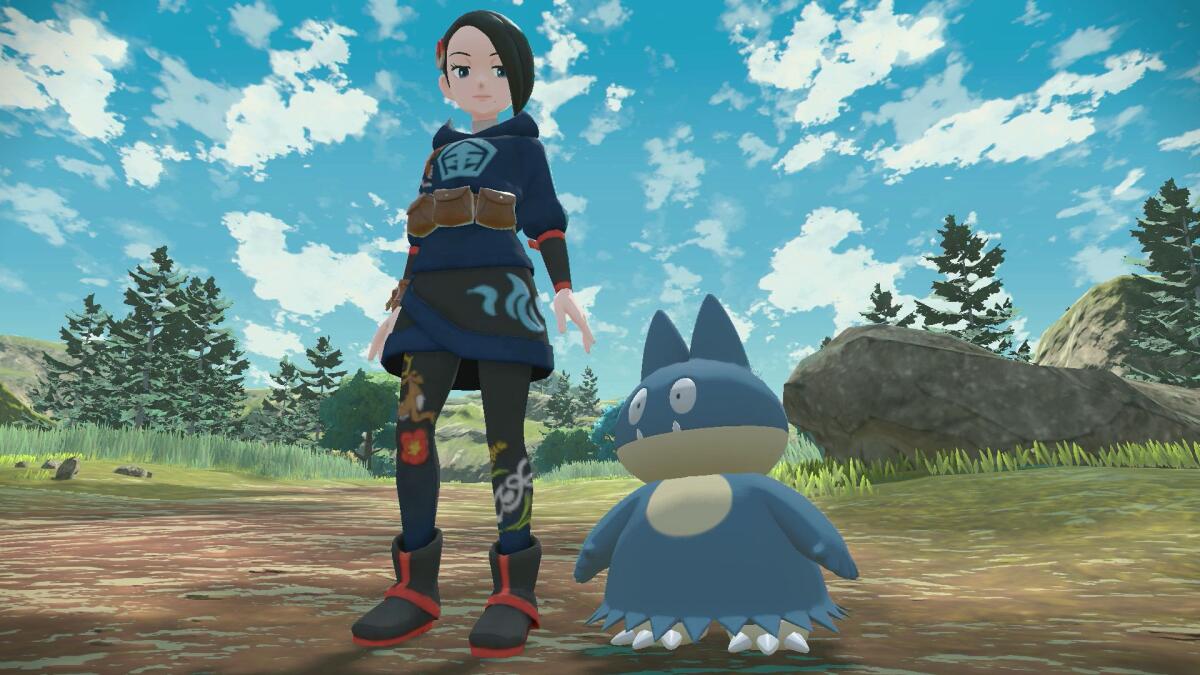
But it’s those characters, namely their devotion to such companions as the pony-like Glaceon, the big blue-eared Luxio and the glacier-sharp Lord Kleavor, among many, many, many others, that results in a “Pokémon” story that extends a hand to the player. We meet a colorful cast — Irida seems even younger than our teen hero with bubble-like bracelets and a suspicious stubbornness, and Adaman’s obsession over time results in him being the only character in the game who blissfully seems to value a short dialogue box.
But they all love their Pokémon. This is an action RPG game with an emphasis that is squarely on adoration of Pokémon. They’re “noble” creatures the game tells us, and they’re less subservient to humans as simply open to living in peace with them. Or tolerating them, rather.
Set significantly in a lore-filled past, long before other modern “Pokémon” games, here Pokémon are treated as deities rather than companions for sport. Even our main character, a teenager the players will define at the outset of the game, is heralded throughout much of the game as a messenger of a god-like character, having fallen out of the sky from a land “beyond both time and space.”
Nintendo master game developer Junichi Masuda reveals a bit of Pokémon magic and two players make their own discoveries on their journeys through the new games “Pokémon Sword” and “Pokémon Shield.”
My avatar looks like a normal kid rather than a goddess to me — complete with contemporary clothing at the start — and in a game with more complex ambitions it could have been tricky to see someone so earthbound treated as a potential supreme being by local tribes. But while “Pokémon Legends: Arceus” isn’t without some clunky dialogue here and there, its intentions appear to be pure.
We join other villagers as a part of the so-called Galaxy Team, relative newcomers to the region who want to work with the clans rather than supplant them, even if it’s science and order that appear to rule the Galaxy Team, and even if they’re not above using quote marks when discussing the clan’s beliefs. While having not yet finished the game, when it comes to our protagonist, at least, so far the tribes aren’t looked down upon or treated as getting in the way, and it’s easy to see that the game paints them as more understanding Pokémon.
The clans simply have the ability to better communicate with Pokémon. They don’t need Poké Balls to work alongside the creatures, and the game appears to preach living a life of balance among nature, time and science. The two tribes and the Galaxy Team all have something to learn from one another.
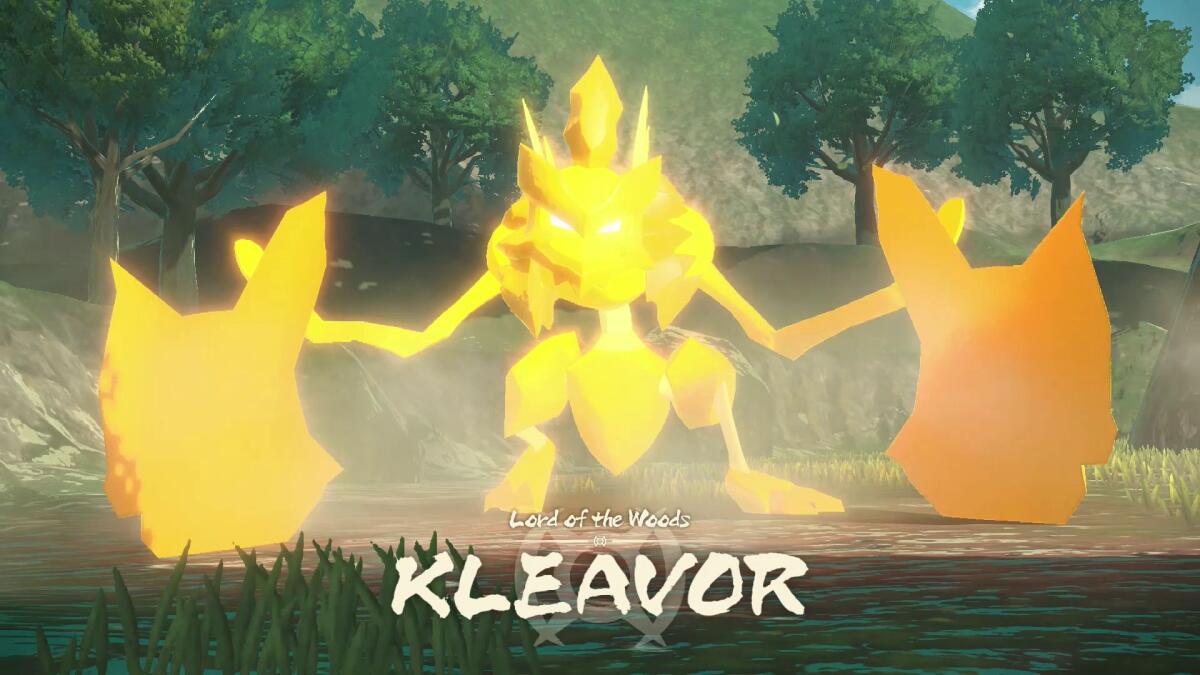
Members of the Galaxy Team can be militaristic, and we’re constantly told if we fail in our mission we’ll be tossed out into the wilds on our own. Our role as a member of the survey corps is to study Pokémon, but our player-created protagonist turns out to be the most formidable Galaxy Team member when it comes to battle. This is another place where “Pokémon Legends” deviates from prior games.
Set in more of an open-like world — think a go-anywhere landscape of “The Legend of Zelda: Breath of the Wild” but with training wheels and limits — we can generally pick or avoid Pokémon conflicts as we see fit. Sometimes they’ll chase us, but a few dodges often do the trick if we want to avoid a clash.
Additionally, if we’re able to sneak up on a Pokémon, we can capture them outright with a well-timed toss of a Poké Ball and often avoid a fight (some Pokémon need a fight to be caught, however). It’s a “Pokémon” game that thankfully wants to capture the free-flowing ability of “Pokémon Go” to simply walk.
Why this augmented reality pedometer game might help relieve stresses of our COVID-damaged world and make our walks — and the metaverse — more beautiful.
These are all welcome additions. As someone who came to Pokémon late, something that always slowed my appreciation of the games was their continued insistence on throwing me into battle with every few steps I took.
One of the underlying themes of the game is curing Pokémon who have apparently been stricken with a mysterious lightning bolt and are going mad. While some in the clans wonder if this is bullying a Pokémon, the game tries to take a friendly tone. We can subdue them, for instance, by pummeling with treats rather than Poké Balls.
These scenes give “Pokémon Legends: Arceus” more of a straightforward action game feel. We run and dodge giant Pokémon while also taking aim at them in an effort to help rid them of whatever it is that’s afflicting them. But these moments, as well as our missions that have us hunting for ancient artifacts, add a sense of mystery to the game.
There are, throughout the game, random stones and pieces of caverns that hold hidden secrets or powers. At long last the Pokémon world of the games feels relatively fleshed out beyond capturing and fighting and training with critters.
“Pokémon Legends: Arceus” makes it clear the creatures had a past and a culture, even inspiring a religious devotion, long before humans realized they’re entertaining to fight with. In this sense, it’s not just the Pokémon that are otherworldly here; it’s the general feel of the entire game.
Pokémon Legends: Arceus
More to Read
The biggest entertainment stories
Get our big stories about Hollywood, film, television, music, arts, culture and more right in your inbox as soon as they publish.
You may occasionally receive promotional content from the Los Angeles Times.
